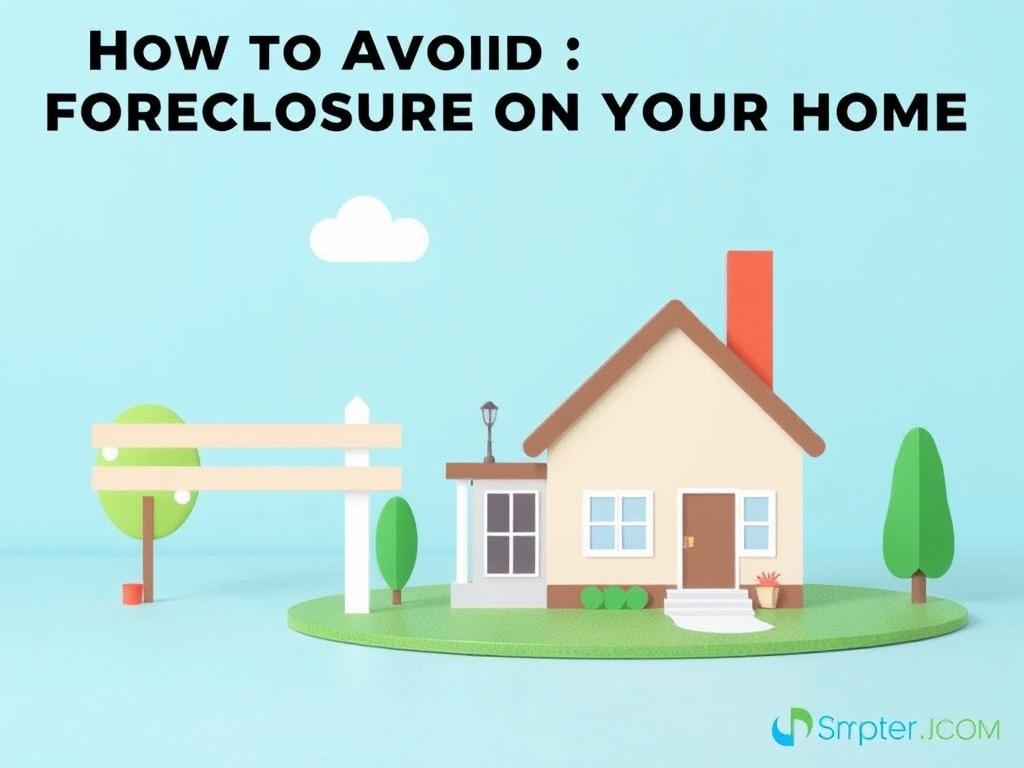SQLITE NOT INSTALLED
Facing the possibility of foreclosure on your home can be one of the most stressful and overwhelming experiences a homeowner can encounter. Your home is not just a place to live; it’s often your largest investment and the foundation of your family’s financial security. The good news is that foreclosure is not inevitable, and with the right knowledge and timely action, you can take effective steps to avoid it. In this article, we’ll walk you through everything you need to know about how to avoid foreclosure on your home—covering practical strategies, important terminology, and resources to help you stay on track.
Foreclosure typically occurs when a homeowner falls behind on mortgage payments, and the lender starts a legal process to recover the money owed by selling the property. But before that happens, there are numerous options available to stop or delay foreclosure, allowing you to keep your home or minimize the blow. Throughout this article, you’ll discover the key actions you should consider, understand how lenders think, and learn the importance of communication and financial planning in this difficult time.
Содержание
Understanding the Foreclosure Process: What Every Homeowner Should Know

Foreclosure can feel like an intimidating process, partly because it’s often unfamiliar and complex. Breaking it down into clear stages helps you understand how the process unfolds and where you can intervene to avoid losing your home.
When you receive your first notice of missed payment, your lender will likely send reminders and contact you to discuss your situation. If you continue missing payments, you’ll receive a formal Notice of Default (NOD), which is the official beginning of foreclosure proceedings. This notice lets you know your lender intends to start selling your home if payments are not brought up to date.
After the NOD period, which varies by state, your home may be scheduled for auction. At this stage, options become narrower, but it’s still possible to stop foreclosure through actions like reinstatement (paying past due amounts), loan modification, or selling your home before the auction date.
Common Types of Foreclosure
It’s useful to know that foreclosure processes can vary based on where you live and the terms of your loan. The two main types of foreclosure are judicial and non-judicial:
- Judicial foreclosure: This process requires the lender to go through the court system. A judge will review the case before allowing the home to be sold. This usually takes longer but gives you the opportunity to present your case.
- Non-judicial foreclosure: This is faster and usually takes place outside of court, based on a “power of sale” clause in your mortgage contract, allowing the lender to sell your home without judicial approval.
Knowing which process applies to your home can help you plan your response and timeline.
Immediate Steps to Take When Facing Foreclosure
If you are worried about missing mortgage payments or you’ve already received a notice of default, time is of the essence. Ignoring the problem will only make things worse. Here are immediate steps every homeowner should take to avoid foreclosure:
1. Communicate with Your Lender
One of the most crucial actions is to contact your lender as soon as possible. Lenders prefer to avoid foreclosure because it’s costly and time-consuming for them as well. When you communicate openly, they may offer solutions such as:
- Temporary forbearance to pause payments.
- Loan modification to reduce your monthly payment.
- Repayment plans to catch up over time.
It’s important to be honest about your financial situation and provide requested documentation quickly.
2. Assess Your Financial Situation
Take a detailed look at your income, expenses, debts, and savings. This assessment helps you determine what type of solution you can realistically manage. Creating a budget is a great way to identify areas where you can cut back expenses to free up cash for mortgage payments.
3. Explore Government and Nonprofit Resources
Various government programs and nonprofit agencies exist to help homeowners avoid foreclosure. These programs provide counseling, financial assistance, or mediation services that can help you negotiate with your lender or find alternative solutions.
| Resource | Type | Benefits | Contact Information |
|---|---|---|---|
| HUD-Approved Housing Counselors | Counseling | Free foreclosure prevention advice and budgeting help | hud.gov |
| Making Home Affordable Program | Loan Modification | Helps refinance or modify your mortgage to affordable terms | makinghomeaffordable.gov |
| Local Legal Aid Services | Legal Support | Free or low-cost legal advice if foreclosure is imminent | Varies by location |
Key Strategies to Avoid Foreclosure on Your Home

Once you’ve taken the initial steps, it’s time to dive into specific strategies designed to keep you in your home or minimize financial harm. Here are the most effective ways to avoid foreclosure:
Loan Modification
One of the most popular and effective options is a loan modification. This involves changing the terms of your existing mortgage to make your payment more affordable. Modification could include lowering your interest rate, extending the loan term, or even reducing the principal balance in some cases.
To initiate a loan modification, you’ll typically need to provide financial documents such as pay stubs, tax returns, bank statements, and a hardship letter explaining why you are struggling to make payments.
Repayment Plans
If your financial difficulty is temporary, a repayment plan might work. These plans allow you to catch up on missed payments over time by adding a portion of overdue amounts to future mortgage payments. This can ease the burden of a lump sum payment and keep you current.
Forbearance Agreements
Forbearance allows you to pause or reduce payments temporarily. This is helpful if you’ve experienced a short-term hardship like job loss or illness but expect your financial situation to improve soon. However, the missed payments must still be repaid eventually.
Refinancing Options
Refinancing your mortgage can lower your interest rate and monthly payment, making it more affordable. However, qualifying for refinancing can be difficult if your credit has been negatively impacted by missed payments.
Sell Your Home (Avoiding Foreclosure Sales)
If keeping your home is no longer feasible, selling it before foreclosure can preserve your credit and help you avoid the long-term consequences of foreclosure. Selling can allow you to pay off your mortgage balance or negotiate a short sale with your lender if your home’s value is less than the amount owed.
Common Mistakes to Avoid When Trying to Prevent Foreclosure
Avoiding foreclosure isn’t just about knowing what to do—it’s also about steering clear of actions that can complicate your situation:
- Ignoring letters or calls from your lender: This can lead to missed opportunities for assistance.
- Borrowing money without a clear plan: Taking on additional debt may worsen your financial situation.
- Falling for scams: Some companies promise to “save your home” for upfront fees but deliver little help.
- Making partial payments without discussion: Some lenders may not accept partial payments and may still begin foreclosure proceedings.
Being proactive, informed, and cautious can make a significant difference.
How Your Credit Is Affected by Foreclosure and Alternatives
Foreclosure on your home can severely damage your credit score, often lowering it by 100 points or more. This damage can last for seven years, affecting your ability to secure loans, credit cards, or even rent.
However, choosing alternatives like a short sale, deed in lieu of foreclosure, or loan modification can be less damaging to your credit and appear more favorable to future lenders. Understanding these options empowers you to make the best financial decision for your situation.
Comparison Table: Foreclosure Alternatives and Their Credit Impact
| Option | Credit Impact | Time to Recovery | Key Benefit |
|---|---|---|---|
| Foreclosure | Severe negative impact | 7 years or more | Keep some home equity until sale |
| Loan Modification | Minor negative impact or none, depending on lender reporting | 1-2 years | Keep your home with manageable payments |
| Short Sale | Less negative than foreclosure | 2-3 years | Avoids foreclosure; lender approves sale below mortgage balance |
| Deed in Lieu of Foreclosure | Less negative than foreclosure | 2-3 years | Lender accepts deed to avoid foreclosure process |
How to Work Effectively with a Housing Counselor or Attorney
If you’re feeling lost or overwhelmed, reaching out for professional guidance can be a game-changer. Housing counselors offer free or low-cost help with budgeting, mortgage questions, and negotiation with lenders. Attorneys can provide legal advice, especially if you are facing a judicial foreclosure or need to understand your rights and responsibilities.
When choosing a counselor or attorney:
- Verify credentials and avoid upfront fees.
- Ensure they are approved by trusted organizations such as HUD or your state bar association.
- Ask for references or read reviews.
Having an expert by your side can increase your chances of successful foreclosure avoidance.
Summary of Foreclosure Avoidance Options and Their Suitability
| Option | Best For | Requirements | Risks |
|---|---|---|---|
| Loan Modification | Long-term financial hardship | Proof of hardship and income documentation | Possible fees; lender approval required |
| Repayment Plan | Short-term difficulties | Ability to repay past dues over time | Payments may become higher temporarily |
| Forbearance | Temporary setback | Reasonable expectation of future income | Missed payments accrue and must be repaid |
| Selling the Home | Unable to continue payments long-term | Market conditions favorable | May owe difference if not a short sale |
| Short Sale | Home worth less than loan balance | Lender approval; demand hardship documentation | Credit impact; tax consequences |
Preparing for the Future: How to Avoid Foreclosure Risks Moving Forward

Even if you successfully avoid foreclosure now, preventing similar challenges in the future is essential. Creating a strong financial foundation can help. Here are some tips to stay on top of your mortgage payments and safeguard your home:
- Build an emergency fund: Having 3-6 months of expenses saved can cover unexpected income disruptions.
- Create a realistic budget: Prioritize your mortgage and housing costs to prevent falling behind.
- Maintain communication with your lender: If you anticipate issues, talk to them early.
- Monitor your credit and finances regularly: Watch for changes that could impact your loan eligibility.
- Seek professional advice promptly: Don’t wait until problems escalate.
Warning Signs That You May Be at Risk of Foreclosure
Being aware of potential red flags can help you take early action:
- Missing one or more mortgage payments.
- Receiving notices or letters from your lender.
- Maxing out credit cards or relying on loans to make payments.
- Facing a major financial hardship, such as job loss or medical bills.
- Ignoring calls or correspondence from your mortgage servicer.
Recognizing these signs early is critical for timely intervention.
Conclusion
Avoiding foreclosure on your home is challenging but entirely possible with the right approach and resources. The key is to act quickly, stay informed, and communicate openly with your lender and financial advisers. Whether through loan modification, repayment plans, forbearance, or selling your home strategically, there are multiple pathways to protect your investment and credit. Remember, foreclosure is not a guaranteed outcome, and many homeowners successfully navigate this difficult time with patience, persistence, and professional support. Protecting your home starts with understanding your options and taking decisive steps before the situation worsens—your home and financial wellbeing depend on it.
Опубликовано: 23 July 2025 Кредитрон – блог о кредитах, финансах и прочих реверансах
Кредитрон – блог о кредитах, финансах и прочих реверансах

